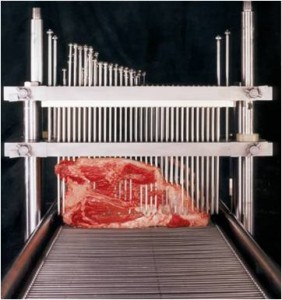The UK Food Standards Agency is full of food safety contradictions: cook meat until it is piping hot; wash watercress to avoid E. coli; and, pink steaks are safe.
Back in August, according to the Daily Mail, district judge Elizabeth Roscoe ruled that London-based Davey’s could continue to serve  rare beefburgers, rejecting claims they were a health risk.
rare beefburgers, rejecting claims they were a health risk.
“There is a balance to be struck between ensuring the safety of the public and allowing them the freedom of choice that they would wish and have a right to expect.”
The council wanted Davy’s beef supplier to sear and shave the outside of whole cuts of meat to remove any harmful bugs.
Davy’s argued that its suppliers could be trusted to supply beef that could be safely eaten.
But Westminster council’s food safety chief James Armitage, “We are not saying burgers should not be eaten rare or medium – merely that they should be prepared in a way that makes them as safe as practicably possible.”
What are those controls?
Before the judge’s ruling, the Daily Mail published a bit about how FSA was going to advise that all meat be cooked until no pink remained.
Color is a lousy indicator.
Stephen Humphreys, director of communications at FSA, explained, “We have issued no guidance that would prevent steaks being served rare, we have no plans to do so and why would we?
Steak is safe to eat ‘rare’. Whole cuts of beef or lamb, steaks, cutlets and joints only have germs on the outside, so as long as the outside is cooked any potentially harmful germs that could cause food poisoning will be killed.”
Not quite.
Steaks that have been needle tenderized have the albeit-low potential for pathogens to be entered into the meat, and requiring a higher cooking temperature.
Food safety advice is never simple.
